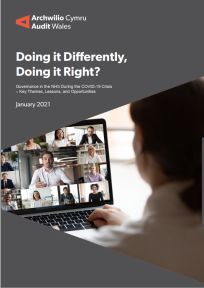News review – March 2021
Unsurprisingly, with elective capacity reduced, waiting lists have lengthened and around 4.5 million people are now waiting for routine surgery. NHS staff and managers are all too aware of this and a group of NHS leaders, led by the NHS Confederation, wrote to the prime minister in February urging the government to be realistic about the recovery period. Staff should be able to take time off to recover and receive ongoing mental health support. The government should be clear with the public about when routine services will be fully back to pre-Covid levels, they said. The 52-week waiting time standard for elective care should be suspended and replaced with a patient-centred approach focusing on clinical need. At the end of December 2020, nearly 225,000 people were waiting more than 52 weeks for planned surgery compared with just over 1,600 a year earlier.
The NHS in Scotland was warned that it will be difficult for the service to address recovery and reduce waiting lists against a backdrop of financial and operational pressures already present before the pandemic. An Audit Scotland report said the Scottish government and health service acted quickly in responding to Covid-19, but could have been better prepared. It also looked at the local NHS finances, noting that while all health boards achieved financial balance in 2019/20, four needed additional financial support from the Scottish government. The Covid pandemic had led to significant additional spending in 2020/21, though allocations have been revised and health boards will be fully funded to deliver financial balance in 2020/21. The auditor added that the pandemic affected savings programmes, though savings trajectories will be reviewed in 2021/22.
With thoughts turning to NHS recovery, NHS Employers said the NHS can play a key role in supporting the turnaround of local economic fortunes. A briefing said that despite rising unemployment, the health service faces ongoing workforce shortages. There are a number of government initiatives and funding available to support NHS organisations to recruit from local populations that have been directly impacted by Covid-19. This will ensure recruitment reflects local diversity and offers opportunities for good-quality work and careers in the NHS.
In late January, the Scottish government announced that health in Scotland will receive a 5.3% cash increase in 2021/22, with a further £869m to tackle the impact of Covid-19. In the Scottish Budget, core health and sport funding will rise by more than £800m in 2021/22, taking the budget to more than £16bn. In total, health boards will share £11.9bn, including £10.6bn for territorial health boards and £1.3bn for the national boards. There will be £1.9bn for primary care and £1.1bn for mental healthcare. The boards will get £500m in capital funding.
The Northern Ireland executive also announced a draft Budget, increasing the Department of Health’s budget to almost £6.6bn in 2021/22. However, the Department believes the 5.7% rise (compared with the 2019/20 baseline), is not enough to meet rising demand and the growing needs of an ageing population. A Department budget document said only £52m of the proposed settlement represents additional recurrent mainstream funding – and this sum has been earmarked to cover Agenda for Change pay increases. It will be challenging to manage the budget against demand, particularly given the pressure on costs prior to the Covid-19 pandemic, the document said.
 There was better news from the Department when it disclosed that a Treasury waiver on the accounting treatment of personal protective equipment (PPE) stock will allow the Northern Ireland Department of Health to spend £175m in 2020/21 on supplies that can be used in 2021/22. Health minister Robin Swann said consumables are usually counted as expenditure as they are used, but the concession will mean his department can build up stock for use in the next financial year. The Department had previously returned £90m of Covid funding that could not be spent on PPE at the time.
There was better news from the Department when it disclosed that a Treasury waiver on the accounting treatment of personal protective equipment (PPE) stock will allow the Northern Ireland Department of Health to spend £175m in 2020/21 on supplies that can be used in 2021/22. Health minister Robin Swann said consumables are usually counted as expenditure as they are used, but the concession will mean his department can build up stock for use in the next financial year. The Department had previously returned £90m of Covid funding that could not be spent on PPE at the time.
 Audit Wales praised the Welsh NHS for its governance during the pandemic. It said good governance has been largely maintained by Welsh NHS bodies during Covid. In a report, Doing it differently, doing it right?, the audit body said Covid-19 had led to a range of changes in the way NHS organisations are governed. These included the introduction of online meetings, more oral reporting, and streamlined agendas. Not only had this maintained effective and efficient governance, but it had also highlighted potential changes. NHS bodies should consider the benefits of retaining some of the changes post-pandemic, including the potential enhancements in public engagement and transparency in holding online meetings.
Audit Wales praised the Welsh NHS for its governance during the pandemic. It said good governance has been largely maintained by Welsh NHS bodies during Covid. In a report, Doing it differently, doing it right?, the audit body said Covid-19 had led to a range of changes in the way NHS organisations are governed. These included the introduction of online meetings, more oral reporting, and streamlined agendas. Not only had this maintained effective and efficient governance, but it had also highlighted potential changes. NHS bodies should consider the benefits of retaining some of the changes post-pandemic, including the potential enhancements in public engagement and transparency in holding online meetings.
The Department of Health and Social Care told the Senior Salaries Review Body (SSRB) it is not seeking pay recommendations for 2021/22. The SSRB’s remit has now been extended to include all very senior managers in the NHS and executive and senior managers in the Department’s arm’s length bodies. In a letter on the body’s remit, health and social care secretary Matt Hancock told the SSRB that public sector pay rises in 2021/22 will be limited and targeted. But he added that work carried out by the SSRB this year would ‘play a key role in positioning senior health manager pay for future years’.
The government has published its proposals to address the discrimination identified in the transitional protection in the 2015 reforms to public service pension schemes. This included the NHS pension scheme. In 2018, the Court of Appeal ruled there had been discrimination, with younger members of the scheme not offered transitional protection. The government said it would now offer members of legacy schemes between 1 April 2015 and 31 March 2022 a deferred choice. Those retiring after March 2022 can choose at retirement whether to take benefits from the legacy or reformed scheme – for those retiring before 31 March 2022, a choice of benefits will be given as soon as practicable, the government said.
The month in quotes
‘Health leaders will continue to prioritise urgent care and patients with the greatest clinical need, but staff are on their knees and many of the pre-pandemic challenges are still very much at play. We are calling on the prime minister to be up front with the public about what the NHS can safely deliver.’
NHS Confederation policy director Layla McCay says the government must be realistic about NHS recovery
The fact that the available recurrent mainstream resource funding has only marginally increased means it will not provide a basis for the sustainable rebuild of our health service.’
The Northern Ireland Department of Health says sustained investment is needed to rebuild services and reduce waiting times
‘The challenge for each individual body is to fully evaluate their new ways of working, consider the opportunities and maintain the sense of urgency and common purpose created during the crisis to establish and embed new approaches to governance.’
Wales auditor general Adrian Crompton says positive governance innovations made in the pandemic should be maintained post pandemic
‘Getting the full range of health services back up and running will be challenging. But there are clear lessons to be learned from the pandemic, both in how the country could have been better prepared and in the innovation we’ve seen. It’s essential these advances are now retained and built upon.’
Stephen Boyle, auditor general for Scotland, on the battle ahead to recover NHS services
From the HFMA
The HFMA continues to publish regular blogs online highlighted in Healthcare Finance weekly, covering topics from mental health to audit, and Brexit to the future role of the finance profession.
HFMA policy and research manager Sarah Day examines proposals for mental health legislation, which would put patients at the centre of decision-making. Dignity is key to wellbeing and health, and the plans go some way to addressing that, but appropriate funding, better facilities and an enhanced workforce will also be needed, she says.
Lee Outhwaite, director of finance at Chesterfield Royal Hospital NHS Foundation Trust, looks at the measures needed in the new financial regime in England to support integrated working. Writing ahead of the government white paper, he points to an HFMA report setting out member views on how the regime should look, especially around transparency and the ownership of risk.
With the UK exiting from the European Union on 1 January after completion of the transition period, Mark Dayan, Nuffield Trust Brexit programme lead, argues that a smaller economy – as forecast by the Office for Budget Responsibility – will likely mean less money for public finances.
Five very different issues are raised in the audit report on the Department of Health and Social Care’s 2019/20 accounts, and those relating to the regularity opinion could have an ongoing impact, says HFMA policy and technical manager Debbie Paterson. These include ministerial direction on pension tax arrangements, special payments and the ‘unprecedented’ issues with one trust’s accounts.
See HFMA blogs
Related content
We are excited to bring you a fun packed Eastern Branch Conference in 2025 over three days.
This event is for those that will benefit from an overview of costing in the NHS or those new to costing and will cover why we cost and the processes.